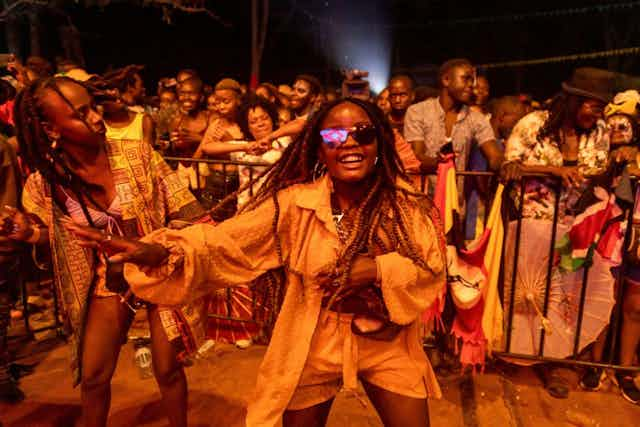First staged in 2015, the globally touted Nyege Nyege Festival in Uganda is an annual four-day dance party featuring hundreds of deejays. It’s also a major tourism drawcard that caters to 15,000-odd lovers of electronic dance music. However, Nyege Nyege is most often in the headlines for creating controversy. Last year the event, the first after a three-year break due to COVID-19, nearly didn’t happen. Uganda’s parliament banned it – and not for the first time – on the grounds that it promoted “sexual immorality”. Eventually the prime minister gave it the go-ahead. This year the festival, being held at a new venue, has faced controversy over the threat of terrorist attacks. Tourism lecturer Amos Ochieng has studied the festival and explains its ongoing dilemmas.
Why is the event in the headlines this year?
There were terror threat warnings just a few days before the opening of this year’s festival. Considering that a sizeable number of event goers come from abroad, the US warned its citizens to avoid crowded places, including this year’s event. The UK also issued a warning.
Reports have speculated there is to be strengthened security at the event. Interestingly, however, moral outrage about the festival from Ugandan leaders has not been an issue this year.
Why did it change venues again this year?
The event was moved into Jinja city (it was previously 30-40km outside the city) on the shores of Lake Victoria for several reasons. The new venue can accommodate larger crowds, which will generate more revenue for all stakeholders. It’s also more convenient in that it’s closer to the city centre, with more accommodation options, and it offers other attractions and activities in the area – such as sport, cruises and bird watching.
Why has Nyege Nyege been so controversial in the past?
The festival promotes electronic dance music and was established by promoters Arlen Dilsizian and Derek Debru to meet the demand among young Ugandans for all-night dance partying. Even though Nyege Nyege promoted the theme of environmental conservation and inclusivity last year, it was the subject of moral outrage and heated debate. The controversy has a lot to do with its name – Nyege Nyege.
In the Luganda language of Uganda, “nyege nyege” is interpreted as an irresistible urge to dance. One dictionary defnition says it means “an intensive feeling for the urgency in need for intimacy, closure and physical exploration”. However, in the Kiswahili language of the larger region, “nyege nyege” is slang for “horny, horny” and is used in relation to sexual urges. As a contemporary and popular musical event, Nyege Nyege is, according to one study, intended to “create intense and affective aesthetic experiences for its participants”.
During a parliamentary session last year a member of parliament ardently argued for its cancellation. Parliamentarians, religious and opinion leaders, human rights activists and some government officials publicly questioned the integrity of the event for being a potential breeding ground for sexual immorality. The Speaker of the Ugandan parliament declared it banned just over a week before it was to be held.
Controversially, in just less than 24 hours, an emergency meeting chaired by the prime minister cleared the event to take place. She argued that it was too late to cancel as thousands of tourists were expected for the festival. A banning would cause financial losses. She assured the public that the event would take place under strict guidelines, including no underage guests and no nudity.
The roots of the resistance to the festival lie in the fact that Uganda is a conservative country with a strong position of Christian morality and a wish to preserve “traditional values”. Homosexuality, for example, is outlawed in the country under increasingly strict laws.
In 2018, the Nyege Nyege Festival was cancelled by Uganda’s ethics and integrity minister on moral grounds but was later cleared to continue. This could be seen as part of government’s commitment to turn Ugandan music and local entertainment into economic goods forming a core part of the creative tourism industry segment. After all, the production of specialised music has a cohesive role in creating local identities and touristic images and products. These can be promoted and marketed to diversify Uganda’s tourism product base.
There is an urgent need for Uganda to develop regulatory guidelines instead of being reactionary.
What role does the festival play for tourism?
Music and dance are a growing part of the creative tourism industry. Like other festivals and cultural displays they are part of the everyday spaces of leisure, a source of artistic expression and audience pleasure.
Allowing Nyege Nyege to continue reflects Uganda’s preparedness to handle large numbers of tourists. The event will provide opportunities for the sale of locally produced materials for improved local livelihoods. As an opportunity for cross-cultural interactions, Ugandan cultures could feature prominently.
The electronic dance music community is a new niche with enthusiastic promoters recruiting new members to build a like-minded community. This community boasts diverse audiences with diverse artistic tastes and consists of smaller (local, translocal or virtual) groups of musicians, fans, promoters and the like. So the festival is a growing leisure activity in Uganda with a moral dilemma.
What is the future for an event like Nyege Nyege?
Uganda, with its strong religious and cultural foundation, will continue to challenge the promotion of Nyege Nyege.
Local music articulates issues around identity, conformity, performance, status, community, subculture, high culture, technology, power relations, education, place and space. How best can all these aspects be integrated to embrace the electronic dance music community for a sustainable tourism industry in Uganda – while still preserving the sanctity of cultural values?
The government departments and agencies responsible for tourism should work with the organisers to draw the best alternatives to promote and conduct the event, and still preserve our cultures.
This article was updated to reflect developments at the 2023 Nyege Nyege festival.

